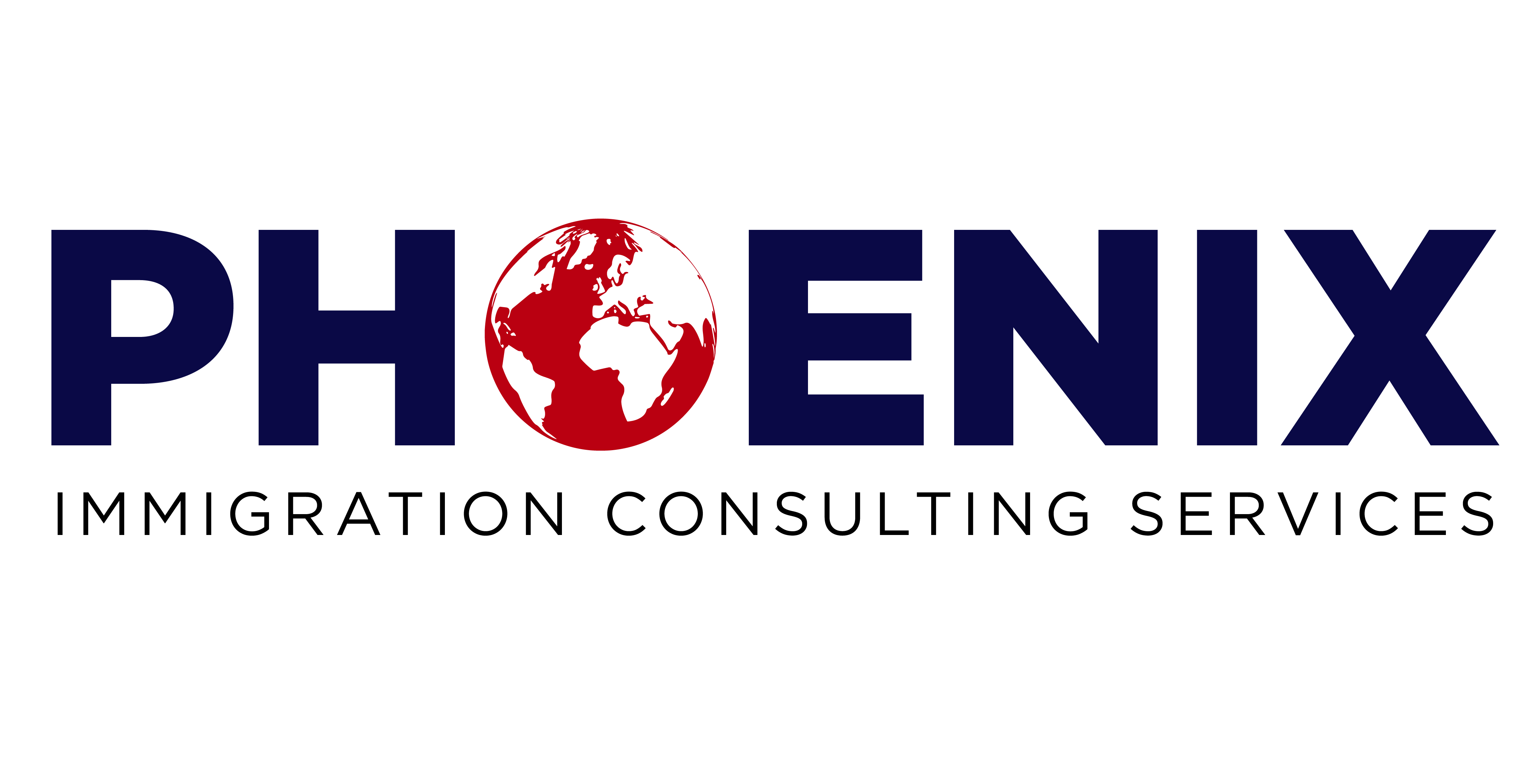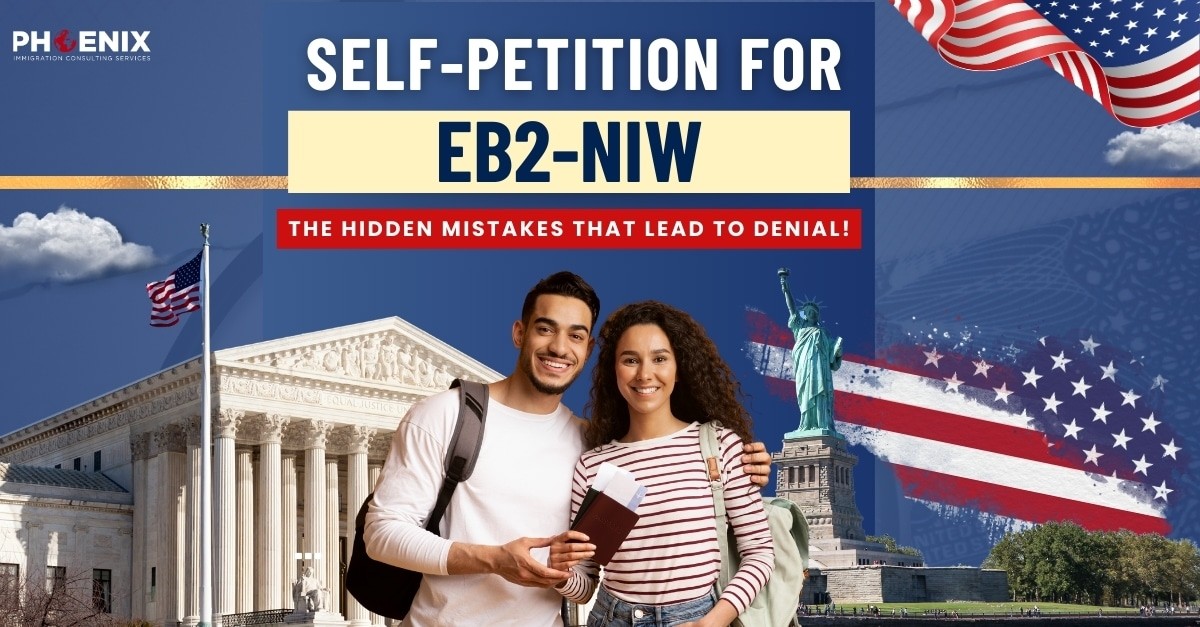Self-Petition for EB2-NIW: The Hidden Mistakes That Lead to Denial!
Introduction: Why So Many Brilliant Applicants Fail at EB2-NIW Self-Petitioning
Each year, we see skilled and educated professionals from different parts of the world trying to apply for the EB2-NIW (National Interest Waiver) visa in hopes of making their way to the USA, and calling it their Permanent Residency.
They feel that because advanced degrees, foreign publications, or lengthy work experience accompany their application, the approval will be an automatic guarantee.
That is not true, and the reality is often very different from what is anticipated.
Even with remarkable credentials, they fail to get approval for reasons other than lacking qualifications. The primary reason being without meeting all the guidelines put forth by USCIS or failing to either assemble or present their case correctly.
It is safe to say that brilliance alone is the most overrated myth in this domain.
Indeed, the brilliance and experience claimed doesn’t get you very far, cause no matter how scholarly you may be, USCIS evaluation is omnipresent—and along with considering how well you document your case, and whether your position is essential so a labor certification is not needed, the bid also needs to justify how your work furthers the interests of the USA.
Common reasons for rejection include the following:
- Claims about national benefit lacking documentation
- Generic and poorly authored letters of recommendation
- Not sufficiently responding to the Matter of Dhanasar criteria
REALITY CHECK: USCIS officers do not infer things. If there is no proof, they do not assume. Even leading researchers or entrepreneurs get denied if they don’t explicitly state how their work relates to the U.S. national interests.
Reference: Matter of Dhanasar Decision – justice.gov
Understanding the EB2-NIW: What It Is and Why It’s So Powerful
The EB2-NIW (Employment Based, Second Preference - National Interest Waiver) is a U.S. immigration category designed for individuals who meet at least one of the following criteria:
- An advanced degree (Master’s or higher, or a Bachelor’s degree plus 5 years of progressive experience), or
- Exceptional ability in the sciences, arts, or business.
The extraordinary power of the EB2-NIW is that applicants can self-petition, meaning they do not require a job offer or sponsorship from a U.S. employer. Crucially, they can also request a waiver of the labor certification process by demonstrating that their work will serve the national interests of the United States.
This category arises under the Immigration and Nationality Act (INA) and has been shaped by key legal decisions, especially the Matter of Dhanasar (2016), which established a three-part test to determine eligibility for the National Interest Waiver.
Eligibility Requirements
To qualify for the EB2-NIW, applicants must meet two layers of eligibility:
- EB2 General Eligibility:
- Hold an advanced degree (or equivalent), OR
- Possess exceptional ability in sciences, arts, or business.
(Refer to USCIS EB2 Eligibility Criteria for full details.)
- National Interest Waiver (NIW) Test: As per the Matter of Dhanasar, the applicant must demonstrate that:
- The proposed work has substantial merit and national importance.
- The applicant is well positioned to advance the proposed endeavor.
- It would benefit the U.S. to waive the job offer and labor certification requirements.
Why People Choose to EB2-NIW Self-Petition
- Self-control over the petition process — no employer sponsorship needed.
- Skips the time-consuming PERM labor certification — faster processing.
- Post-approval flexibility to work in any industry or state.
- Ideal for entrepreneurs, public health experts, researchers, and tech pioneers.
- Enables freelancers, consultants, or post-docs to transition smoothly to permanent residency.
This pathway is particularly attractive for professionals engaged in high-impact work — such as climate researchers, cancer scientists, AI engineers, and infrastructure developers — whose efforts align with U.S. national priorities.
Learn more at: USCIS EB2-NIW Information Page
The Self-Petition Process Demystified: A Step-by-Step Breakdown
The process of applying for the EB2-NIW through self-petitioning may seem complicated, but when broken down into actionable steps, it becomes much more manageable. Here’s a structured guide to help applicants confidently move forward.
Step 1: Confirm Eligibility for EB2 & NIW
- Establish eligibility under the EB2 category (advanced degree or exceptional ability).
- Confirm compliance with the three-pronged Matter of Dhanasar test:
- Substantial merit and national importance
- Well-positioned to advance the endeavor
- Benefit to the U.S. by waiving job offer and labor certification
More on EB2-NIW Policy: USCIS Policy Manual
Step 2: Gather Supporting Documents
Sample documents to prepare:
- Academic credentials and transcripts
- Proof of employment and achievements
- Recommendation letters from field experts
- Publications, awards, citations, and media features
- Evidence of national/international relevance
Documenting credentials: USCIS Citizenship Resources
Step 3: Write Your Petition Letter (Cover Letter)
- Summarize your qualifications and expertise
- Link your work to all three Dhanasar prongs
- Describe how your efforts advance U.S. national interests
- Reference attached evidence and exhibits clearly
Step 4: Complete Form I-140
- File the Form I-140 as a self-petitioner
- Skip the employer sponsorship sections
- Include all documentation and pay the $700 fee
Form Info: USCIS I-140 Page
Step 5: Submit to USCIS
File your petition at the correct USCIS service center (typically Texas or Nebraska, depending on your residence).
Filing details: USCIS Direct Filing Addresses
Step 6: Decision by USCIS
- Receive your Form I-797 (Notice of Receipt)
- Processing may take 6–12 months on average
- You may receive a Request for Evidence (RFE) if clarification is needed
Once approved, file Form I-485 if you are in the U.S., or proceed with Consular Processing if abroad.
Green Card Process: USCIS Green Card Procedures
Mistake #1: Lack of a National Interest Argument
One of the most common reasons for denial is a vague or generic explanation of how your work benefits the United States. USCIS requires clear, evidence-backed reasoning, not assumptions.
- Failing to connect work with U.S. national benefit
- No third-party validation or media to support claims
- Include proof of impact (news features, citations, endorsements)
- Frame your contribution in national, not just organizational, terms
Mistake #2: Lacking Evidence for Your Credentials
Academic and professional claims must be supported with strong documentation. USCIS does not take your word for it.
- Assuming credentials are self-evident
- Omitting transcripts or reference letters from employers
- Submit diplomas, transcripts, and detailed employment history
- Use employment verification letters to highlight key roles and outcomes
Mistake #3: Poorly Prepared Letters of Recommendation
Weak or irrelevant recommendation letters can diminish your case. USCIS values credible expert opinions, not personal praise.
- Vague letters that don’t address the petition’s purpose
- Letters from unrelated or non-authoritative sources
- Choose qualified experts familiar with your field
- Ensure letters address your national contributions specifically
Mistake #4: Ignoring the Matter of Dhanasar Framework
The Matter of Dhanasar ruling is central to EB2-NIW eligibility. Failing to structure your petition around it significantly increases the risk of denial.
- Work must have substantial merit and national importance
- Applicant must be well-positioned to advance the work
- U.S. must benefit from waiving job/labor certification requirements
- Structure your petition around these three prongs
- Provide specific evidence under each category
Full Decision: Matter of Dhanasar PDF
Mistake #5: DIY Without Guidance – When Google Becomes Dangerous
While self-petitioning is allowed, navigating the process using outdated or incorrect online information can lead to major missteps.
- Using templates that don’t apply to your situation
- Not staying updated with evolving USCIS policy
- Hire an experienced immigration attorney familiar with EB2-NIW petitions
- Subscribe to USCIS updates and official immigration alerts
Finalizing Your Green Card
Once your I-485 is approved or you complete the immigrant visa interview abroad, you will officially become a U.S. permanent resident. This marks the final step in your EB2-NIW journey.
Bonus Trap: Relying on Templates That Everyone Else Is Using
Every applicant, at least once in their lifetime, tends to sabotage their unique EB2-NIW petitions by copying “successful” templates and downloadable samples that are readily available on the internet. Even when these resources appear to be useful, they end up causing more harm than good.
Why This Is a Critical Mistake
- Use of Anti-Plagiarism Software by USCIS:USCIS employs plagiarism software to spot duplicate petition phrases. When numerous applicants submit similarly written letters, personal statements, or recommendation letters, red flags are raised. This can lead to a Request for Evidence (RFE) or even outright denial.
- Absence of Personalization through the Template Approach:Generic templates fail to capture your unique contributions, discipline-specific expertise, and national interest. Template-based submissions often lack detail and misrepresent the congruence between your work and the national interest.
- Claim Language That is Harsh Towards Your Voice:Phrases like “I am writing to recommend…” or “He is a highly skilled individual…” are overused and uninspiring. Such bland lexicon makes your petition unremarkable and disconnected from your unique achievements.
What To Do Instead
- Formulate a Distinctive Petition Framework: Create a narrative that highlights your experiences, accomplishments, and personal journey.
- Tailor the CV-Based Recommendation Letters: Ensure each letter reflects the recommender’s voice, your specific impact, and is aligned with your field.
- Don’t Use Generic Templates: Use available resources only as guides, never as your final documents.
- Seek Professional Help or Employ AI Creatively: Leverage tools like ChatGPT or professional attorneys to customize your documents effectively.
The Role of Evidence: What is the Most Critical Aspect of an Application – “Decision-Ready”
A well-drafted EB2-NIW petition tells a compelling story backed by evidence. It’s not just about writing – it's about presenting verifiable proof and structuring your petition logically for USCIS adjudicators.
What Makes a Petition “Decision-Ready”
- Each Statement Is Supported With Evidence:If you claim prestigious journal publications, attach copies. For national recognition, include media coverage, award letters, and institutional acknowledgments.“In order to rely on undocumented information, independent, credible evidence must exist.” – USCIS Policy Manual
- Use of Exhibit Indexes Organized and Structured:Include a Table of Contents and properly labeled exhibits (e.g., Exhibit A: PhD Degree, Exhibit B: Publications) to enhance professionalism and clarity.
- Validation from Other Sources:Objective third-party verification is critical. Include:
- Letters from independent experts (not personal friends)
- Government grants and funding documents
- Media coverage and press mentions
- Commercialization records or patents
- Strength Over Volume:A focused, relevant petition with clear evidence is better than thousands of loosely related documents.
Common Evidence Mistakes to Avoid
- Using outdated or unverifiable documents
- Failing to translate non-English materials
- Submitting a CV without explanation or context
- Including vague recommendation letters without specific project details
Ready to Take the Next Step Toward Your EB2-NIW Success?
The self-petition process for the EB2-NIW visa is not simply about completing forms and gathering documents; it is about crafting a persuasive narrative that demonstrates how valuable you are to the United States. Whether you're a researcher, an entrepreneur, a doctor, or an academic, your experiences are important—they just need to be articulated, shown logically, and presented convincingly.
If you're feeling overwhelmed, uncertain, or just want to ensure you’re on the right track, you're not alone.
At Phoenix Immigration Consulting Services, we specialize in personalized EB2-NIW guidance, helping talented individuals like you build powerful, decision-ready petitions that stand out.



Leave a Reply
Your email address will not be published.